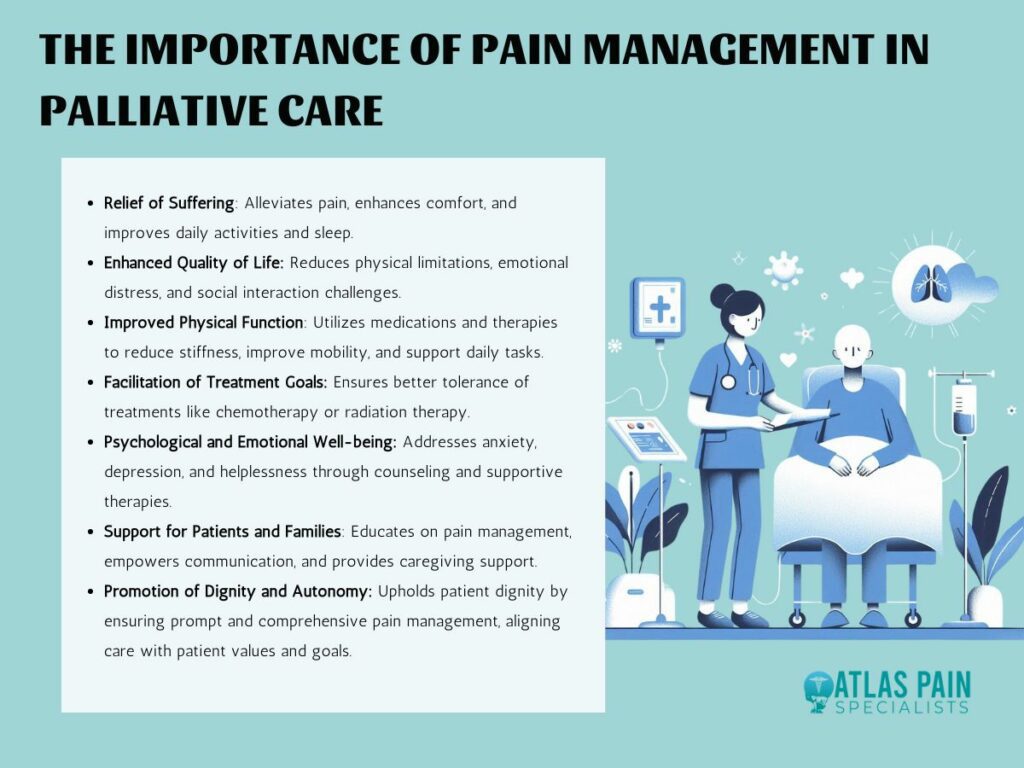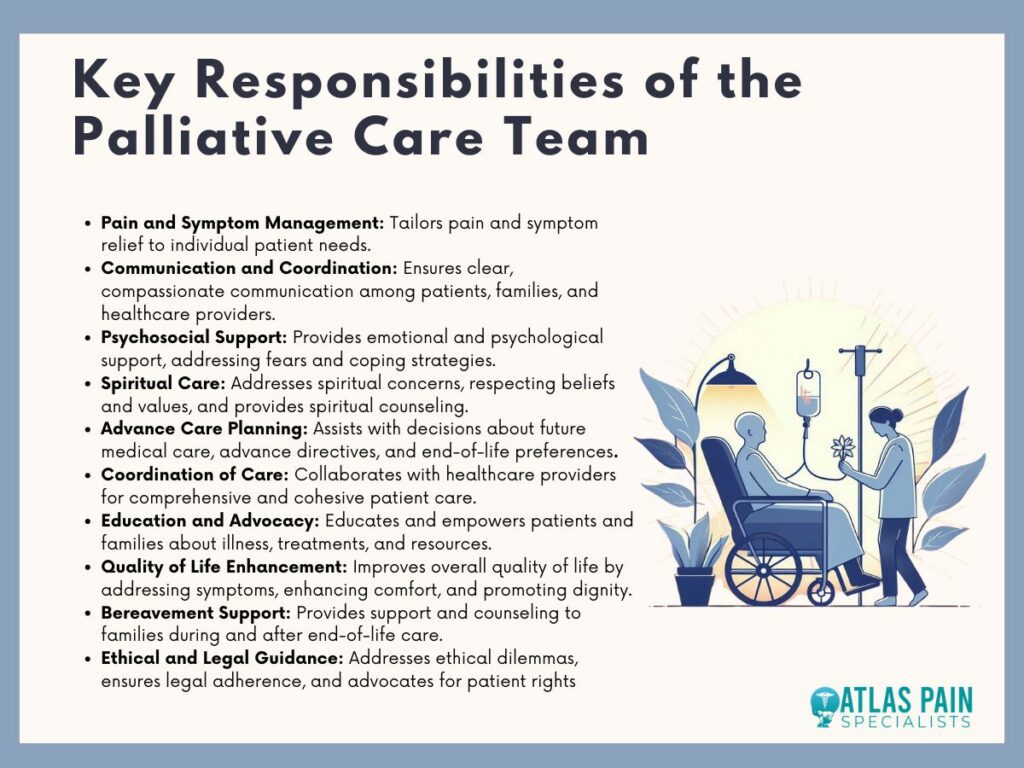

The Role of Palliative Care in Comprehensive Pain Management
Palliative care is a specialized area of healthcare that focuses on relieving the symptoms, pain, and stress of serious illnesses, regardless of the diagnosis or stage of the disease. Its primary aim is to improve the quality of life for both patients and their families.
Pain management is a central component of palliative care, and it involves a holistic approach that addresses physical, emotional, social, and spiritual aspects of pain. This article explores the crucial role of palliative care in comprehensive pain management, highlighting its principles, strategies, and benefits. Let's look at the role of palliative care in comprehensive pain management.
Understanding Palliative Care
Palliative care is a specialized medical approach for individuals with serious illnesses, focused on alleviating symptoms and reducing stress to improve quality of life. Unlike conventional medical care aimed at curing illness, palliative care prioritizes symptom management, emotional support, and overall well-being for patients and families. This holistic approach acknowledges the complex needs of those facing serious illnesses, supporting them through every stage of their condition, irrespective of curative options.
The Importance of Pain Management in Palliative Care
Pain management holds significant importance in the context of palliative care, which is specialized medical care focused on enhancing the quality of life for patients with serious illnesses. Here are key reasons why pain management is crucial in palliative care:

Relief of Suffering
Pain is one of the most distressing symptoms experienced by patients with serious illnesses. Effective pain management in palliative care aims to alleviate suffering and improve overall comfort. By controlling pain, palliative care enhances the patient's ability to engage in daily activities, sleep better, and maintain a sense of normalcy.
Enhanced Quality of Life
Chronic pain can severely impact a patient's quality of life by limiting physical function, causing emotional distress, and affecting social interactions. Palliative care focuses on optimizing quality of life, and effective pain management plays a pivotal role in achieving this goal. It allows patients to participate more fully in activities they enjoy and maintain their independence for as long as possible.
Improved Physical Function
Pain management strategies, including medications and therapies like physical rehabilitation, help improve physical function. This may include reducing stiffness, improving mobility, and enhancing overall physical capabilities. By managing pain effectively, palliative care supports patients in maintaining their ability to perform essential daily tasks and activities.
Facilitation of Treatment Goals
Many patients receiving palliative care are undergoing treatments such as chemotherapy or radiation therapy. Uncontrolled pain can hinder their ability to tolerate these treatments or adhere to their treatment plans. Effective pain management ensures that patients can better endure treatments, potentially improving treatment outcomes and overall prognosis.
Psychological and Emotional Well-being
Chronic pain can lead to significant emotional distress, including anxiety, depression, and feelings of helplessness. Palliative care addresses the psychological aspects of pain by providing counseling, supportive therapies, and strategies to cope with pain-related emotions. By managing pain effectively, palliative care supports emotional well-being and enhances overall mental health.
Support for Patients and Families
Pain affects not only the patient but also their loved ones. Effective pain management in palliative care includes educating patients and their families about pain management strategies, empowering them to monitor and communicate pain levels, and providing support and guidance throughout the caregiving process. This holistic approach helps families cope with the challenges of caregiving and supports open communication about treatment goals and preferences.
Promotion of Dignity and Autonomy
Pain management is essential in upholding the dignity and autonomy of patients facing serious illnesses. By addressing pain promptly and comprehensively, palliative care affirms patients' right to comfort and relief, regardless of their prognosis. This approach supports patient-centered care and ensures that care plans are aligned with the patient's values, preferences, and goals.
By employing a multidisciplinary approach tailored to individual needs, palliative care teams strive to provide compassionate and effective pain relief, ensuring that patients can live as comfortably and fully as possible despite their illness.
Components of Comprehensive Pain Management in Palliative Care
Comprehensive pain management in palliative care encompasses a range of strategies and interventions aimed at addressing pain from multiple perspectives—physical, psychological, social, and spiritual. Here are the key components:
Assessment and Diagnosis
Thorough evaluation of pain characteristics, including intensity, location, and type, to understand underlying causes and tailor treatment plans.
Pharmacological Interventions
Use of medications such as opioids, non-opioids, and adjuvant therapies to manage pain effectively while minimizing side effects.
Non-Pharmacological Interventions
Incorporation of therapies like physical therapy, massage, acupuncture, and psychological interventions to complement medication and alleviate pain.
Interventional Procedures
Utilization of techniques such as nerve blocks, epidural injections, and radiofrequency ablation for targeted pain relief when medications are insufficient.
Education and Counseling
Provision of patient and family education on pain management strategies, potential side effects, and emotional support to enhance coping mechanisms.
Multidisciplinary Collaboration
Coordination among healthcare providers, including physicians, nurses, therapists, and counselors, to develop and implement personalized pain management plans.
Continuity of Care and Advance Planning
Ensuring consistent care through effective communication and advance care planning discussions to align treatment goals with patient preferences.
These components work synergistically to address pain comprehensively, enhance quality of life, and provide holistic support for patients and families in palliative care settings.
The Role of the Palliative Care Team
The role of the palliative care team is pivotal in providing comprehensive and compassionate care to patients facing serious illnesses. This multidisciplinary team collaborates to address the diverse needs of patients and their families, focusing on enhancing their quality of life and supporting them throughout their illness journey. Here are the key components of the palliative care team and their roles:
- Physicians: Diagnose and prescribe appropriate pain management treatments.
- Nurses: Monitor the patient's response to treatment, provide ongoing care, and educate patients and families.
- Social Workers: Offer emotional support, assist with navigating the healthcare system, and connect families with resources.
- Psychologists: Provide mental health support and strategies for coping with pain.
- Spiritual Care Providers: Offer spiritual support to help patients find meaning and comfort.
Key Responsibilities of the Palliative Care Team

Pain and Symptom Management
Ensuring effective management of pain and other distressing symptoms through a tailored approach that considers the individual needs and preferences of the patient.
Communication and Coordination
Facilitating clear and compassionate communication among patients, families, and other healthcare providers to ensure understanding of treatment goals, preferences, and care plans.
Psychosocial Support
Providing emotional and psychological support to patients and their families, addressing fears, anxieties, and coping strategies related to the illness and its impact.
Spiritual Care
Addressing spiritual and existential concerns, respecting the beliefs and values of patients and their families, and providing support through spiritual counseling or connection with religious or spiritual resources.
Advance Care Planning
Assisting patients in making informed decisions about their future medical care through discussions about advance directives, goals of care, and end-of-life preferences.
Coordination of Care
Collaborating with healthcare providers across different disciplines to ensure comprehensive and cohesive care that meets the holistic needs of the patient.
Education and Advocacy
Educating patients and families about their illness, treatment options, and available resources, empowering them to make informed decisions and advocate for their healthcare needs.
Quality of Life Enhancement
Focusing on improving the overall quality of life for patients by addressing physical symptoms, enhancing comfort, and promoting dignity and autonomy.
Bereavement Support
Providing support and counseling to families and caregivers during and after the patient's end-of-life journey, facilitating the grieving process and adjustment to loss.
Ethical and Legal Guidance
Addressing ethical dilemmas related to treatment decisions, ensuring adherence to legal regulations, and advocating for patient rights and dignity.
These responsibilities collectively ensure that palliative care teams provide comprehensive, compassionate, and patient-centered care to individuals facing serious illnesses and their families throughout the illness trajectory.
Challenges in Pain Management within Palliative Care
Pain management within palliative care presents several challenges that healthcare providers must navigate effectively:
Complexity of Pain
Palliative care patients often experience multifaceted pain syndromes due to the nature of their illnesses, which require careful assessment and tailored treatment approaches.
Individual Variability
Pain perception and responses to medications vary widely among patients, necessitating personalized pain management plans that evolve over time.
Polypharmacy and Drug Interactions
Managing pain alongside multiple medications increases the risk of drug interactions and adverse effects, requiring vigilant monitoring and adjustment of treatment regimens.
Barriers to Communication
Factors such as cultural differences, cognitive impairments, and patient reluctance to report pain can hinder accurate pain assessment and effective treatment.
Psychosocial and Emotional Factors
Emotional distress, anxiety, and existential concerns related to serious illness can intensify pain perception and complicate pain management efforts.
Access to Specialized Care
The limited availability of palliative care specialists and interdisciplinary teams may impact the delivery of comprehensive pain management strategies.
Legal and Regulatory Considerations
Balancing the use of opioids and other controlled substances for pain relief with regulatory requirements and safety concerns presents ethical and practical challenges for healthcare providers.
End-of-Life Considerations
Shifting goals of care towards comfort and quality of life as patients approach the end of life requires sensitive discussions and personalized symptom management plans.
Caregiver Support
Educating and supporting caregivers in pain management strategies is crucial for maintaining continuity of care and preventing caregiver burnout.
Addressing these challenges requires a collaborative, patient-centered approach that integrates medical expertise with psychosocial support, communication skills, and sensitivity to ethical considerations. By navigating these complexities, palliative care teams strive to optimize pain management, alleviate suffering, and enhance the quality of life for patients and families facing serious illnesses.
Conclusion
In conclusion, palliative care plays a crucial role in healthcare by enhancing the quality of life for individuals with serious illnesses through comprehensive pain management. This approach, supported by a multidisciplinary team of healthcare professionals, addresses not only physical discomfort but also emotional, social, and spiritual needs.
Despite challenges like complex pain syndromes and communication barriers, palliative care strives to provide personalized, compassionate support. By integrating diverse expertise and fostering open dialogue, palliative care ensures dignity, comfort, and meaningful living for patients and their families, from diagnosis through to end-of-life care.
About Dr. Sean Ormond



